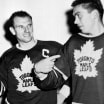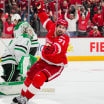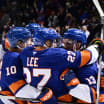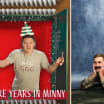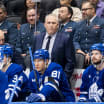College game growing path to NHL
Keller, McAvoy among increasing number of former NCAA players making pro impact
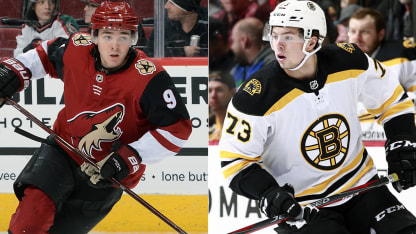
And among those in the top 12 include: Arizona Coyotes center Clayton Keller (Boston University), Vancouver Canucks center Brock Boeser (North Dakota), Winnipeg Jets left wing Kyle Connor (Michigan), Boston Bruins left wing Danton Heinen (Denver), New Jersey Devils defenseman Will Butcher (Denver) and Colorado Avalanche center Alex Kerfoot (Harvard).
It's simply a reflection of the increasing number of NHL players with college experience. In 2004, 23 percent of all NHL players at some point played college hockey, according to College Hockey Inc. In 2017, it increased to 32 percent.
"We're attracting better players and more are opting to go the college route," Boston College coach Jerry York said. "I think the NHL understands the value of what the college programs have as far as practices and programs, and they're benefitting."
Others across the collegiate landscape agree.
"College hockey has done a great job of bringing the elite athlete back and I think that the coaching, the recruiting in college, is incredibly difficult and challenging," said Notre Dame coach Jeff Jackson, whose team will play Michigan in the Frozen Four in St. Paul, Minnesota, on Thursday, with the national championship held April 7. "The elite players are certainly talented enough coming into college hockey to play as freshmen and be successful. When they get into the NHL I think they're very well prepared."
Keller spent two seasons at USA Hockey's National Team Development Program and one season at Boston University before signing an entry-level contract with the Coyotes in March 2017. He's second in the League in rookie scoring with 63 points (23 goals, 40 assists) in 79 games. Mathew Barzal of the New York Islanders has 79 points.
Bruins defenseman Charlie McAvoy spent two seasons with the USNTDP, and played two seasons at BU before signing his contract in April 2017. McAvoy was a top candidate to win the Calder Trophy as NHL rookie of the year before he sustained a sprained medial collateral ligament in his left knee in early March. At the time, McAvoy had 32 points (seven goals, 25 assists) in 59 games and averaged 22:06 in ice time per game.
"College hockey is slowly starting to get the recognition and respect it deserves," BU coach David Quinn said. "I'm not surprised guys leave college and can play in the NHL right away. College is a fast-paced, demanding game, and forces guys to get better. You cannot take a night off in college no matter what the record of the opponent. It's a great training ground for guys who want to play in the NHL."
Connor, fifth in NHL rookie scoring with 51 points (29 goals, 22 assists), was named a finalist for the 2015-16 Hobey Baker Award as college hockey's top player in his only season with the Wolverines.
"In the college games you play, there's a battle every night and you're playing against men at a young age and I think the structure and workouts I had at school really helped grow my game," Connor said. "The practice time really helped because you need to hone your skills at that age."
Wisconsin coach Tony Granato concurs that the tough competition is superb preparation for the pro game.
"Our job as coaches is realizing that the players entering our schools want to move on and play in the NHL so we have to help them get ready for that," said Granato, who had a 14-year NHL career (1988-2001) after playing at Wisconsin. "I think it's great to see the college players having such a big impact in the NHL. It'll continue to grow as far as the number of players stepping out and being able to jump right into an NHL lineup and help teams because of the competition."
Butcher spent four seasons at the University of Denver before signing with the Devils as a college free agent in August. He won the Hobey Baker Award last season and leads all NHL rookie defensemen in assists (39), points (42) and power-play points (21).
"I needed four years just to grow my defensive game," Butcher said. "I thought I made good strides my junior year but I still think I had much to work on. As a junior, I wasn't getting matched up against the top lines so I sat down with [coach Jim Montgomery] and told him I wanted to play against those big lines, and matched against the top players, as a senior."
Devils coach John Hynes said college players gain habits that carry over into NHL life, making it easier. Hynes played under Jack Parker at Boston University, and coached the USA Hockey's National Team Development Program for six seasons.
"Physically, they're well prepared to handle the rigors of the NHL because they understand the value of training, nutrition and rest," Hynes said. "A huge component of college hockey is your offseason training and nutrition. When you get here, regardless of where you come from, it's your lifestyle and choices that enable you to play at this level, and consistently, over 82 games."







